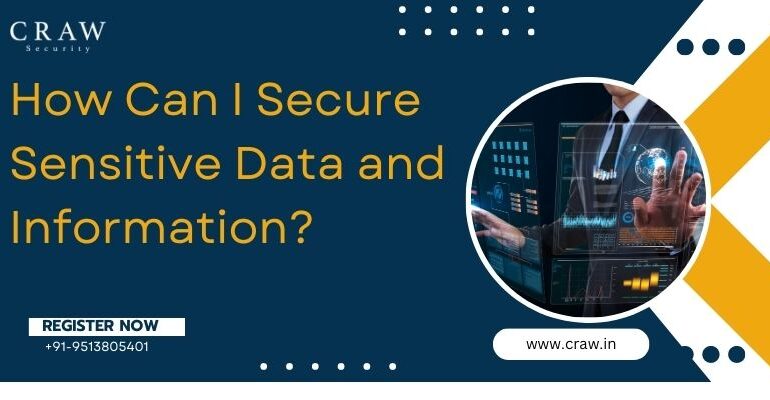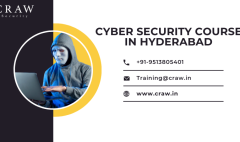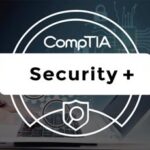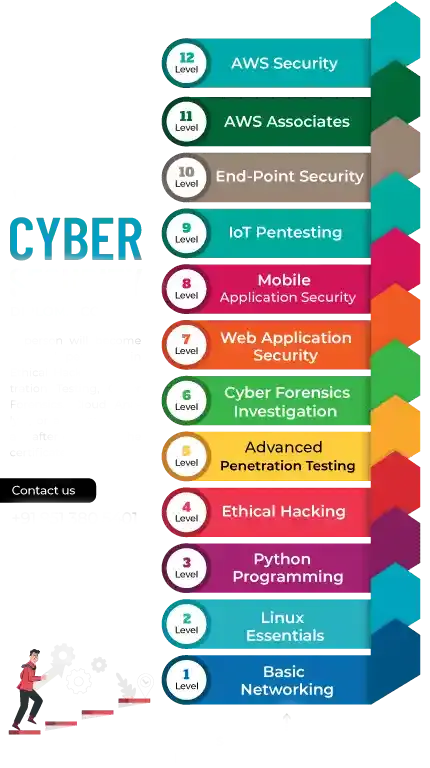How Can I Secure Sensitive Data and Information?

How Can I Secure Sensitive Data and Information?
In the current era filled with technology, both individuals and companies are extremely concerned about the security of sensitive data and information. Strong security measures must be put in place to protect sensitive data, given the rising frequency of cyber threats and data breaches. You will gain useful knowledge and useful advice on how to secure sensitive data and information from this blog post effectively. These tactics will help you keep one step ahead of potential security risks, whether you’re an individual worried about your personal data or a company trying to secure your customers’ information.
Understanding the Importance of Data Security
Understanding the importance of data security is vital before exploring the many methods to protect sensitive data and information. Security breaches can have serious repercussions, including financial losses and reputational harm. It is critical for both individuals and businesses to take preventative steps to safeguard their personal data since cybercriminals are always coming up with new ways to access sensitive information without authorization.
Common Security Risks
Understanding the prevalent security dangers is essential for protecting sensitive data and information. It’s possible to effectively put in place the necessary precautions to lessen potential threats by recognizing these risks. Some notable security risks include the following:
| Phishing Attacks | Phishing attacks entail convincing people to reveal sensitive information by pretending to be a reliable organization. |
| Malware | Systems can be infiltrated by malicious software, such as viruses, worms, or ransomware, which jeopardizes data security. |
| Weak Passwords | Weak or understandable passwords give attackers a simple entry point. |
| Unsecured Wi-Fi Networks | Using unprotected Wi-Fi networks puts confidential information at risk of being intercepted and eavesdropped. |
| Social Engineering | Social engineering strategies use psychological tricks to trick people into disclosing private information. |
Best Practices for Securing Sensitive Data and Information
Let’s examine some best practices for protecting sensitive data and information now that we are aware of the significance of data security and the typical risks associated with it:
- Encrypt Your Data
Sensitive data can be effectively protected with encryption. The information you store becomes unreadable when you encrypt it, and it can only be decoded using a unique key or password, known as the decryption key. It also makes certain that even if someone has access to your data without authorization, they will not be able to understand it.
- Implement Strong Authentication Measures
The information you provide is further secured by means of strict authentication procedures. When possible, think about using multi-factor authentication (MFA). Users must supply two or more forms of verification when using MFA, such as a password and a one-time code texted to their mobile devices. This greatly lowers the possibility of illicit entry.
- Regularly Update Software and Systems
For the purpose of ensuring data security, it is essential to keep your software and systems current. The patches and solutions are frequently included in software updates, thereby rendering it more difficult for attackers to take advantage of identified security flaws. Wherever you can, establish automated updates to make sure you do not miss any crucial security upgrades.
- Train Employees on Security Awareness
Employees should obtain adequate instruction on security awareness because they are essential to preserving data security. Inform your team about the value of secure passwords, how to spot phishing scams, and how to browse safely. Hold training sessions frequently to keep them informed of the newest security procedures.
- Backup Your Data Regularly
In order to guarantee that you can restore your information in the event of a security breach or data loss, you need to frequently back up your information. To prevent the possibility of data loss, select a dependable backup option along with setting up automated backups.
- Restrict Access to Sensitive Data
Not every employee in a company needs access to confidential information. Put role-based control of access in place so that you can confirm that only legitimate people would be able to work on particular files and documents rather than anybody doing anything upon their wish that could backfire in the long run.
- Secure Your Network
Keeping your computer network secure is essential for safeguarding confidential information. In order to track and oversee network traffic that comes and goes, employ firewalls, intrusion detection systems (IDS), and intrusion prevention systems (IPS). To avoid illegal access, use secure Wi-Fi protocols like WPA2 and often upgrade router firmware.
- Regularly Monitor and Audit Systems
System auditing and monitoring must be ongoing if any security concerns are to be quickly identified and addressed. Utilize recording and tracking technologies to keep tabs on system events, network traffic, and user activities. Check and examine these logs on a frequent basis to look for any unlawful or shady activity.
- Use Secure Communication Channels
Utilize safe communication channels whenever you are sending sensitive data. Encrypt data as it is being transmitted using the Secure Sockets Layer (SSL) or Transport Layer Security (TLS) protocols. Sending confidential information over email or additional unsecured channels should be avoided.
- Secure Physical Access
Although it is sometimes disregarded, physical security is just as crucial in securing sensitive data. Manage direct interaction with servers, data centers, and other locations that house sensitive data. To prevent unwanted entry, put safety precautions in place, including access cards, biometric authentication, and surveillance systems.
- Employ Data Loss Prevention (DLP) Solutions
Data Loss Prevention (DLP) resolutions may assist in preventing confidential information loss or unlawful disclosure. These tools keep tabs on and regulate data as it’s being used, stored, and sent. By upholding security guidelines and encrypting critical data, they can identify and stop data breaches.
- Regularly Assess and Update Security Measures
Since safeguarding information is an ongoing procedure, it is essential to periodically examine and revise your security protocols. Execute regular security audits to find vulnerabilities and quickly fix them. To guarantee that your safety precautions continue to be efficient, keep up with the most recent security trends, technology, and best practices under the prime supervision of superb penetration testers.
- Implement an Incident Response Plan
Your greatest attempts may not always prevent security issues. To lessen the effects of such events, it is crucial that there is an incident response plan in existence. The action to be done in the event of a security or data breach should be outlined in the strategy, which includes communication channels, containment techniques, and recovery processes.
- Conduct Regular Security Awareness Training
In order to keep staff members up to date about changing security dangers, security awareness education is essential. To promote sound safety habits, such as recognizing phishing emails, choosing strong passwords, and disclosing suspicious activity, hold periodic training sessions. Foster employee vigilance and encourage a security-conscious culture within the company.
- Secure Third-Party Vendors and Partners
Check that they follow strict security procedures if you collaborate with third-party vendors or collaborators who have a hold on your private and sensitive type of information. Do your homework before working with vendors, checking out their security guidelines, credentials, and background. Clearly define contractual obligations for data security and periodically check that they are being met.
Frequently Asked Questions (FAQs)
About How Can I Secure Sensitive Data and Information?
1: How can I secure sensitive data on my mobile device?
It’s essential to secure private information on your mobile device to safeguard your privacy and stop unlawful access. You may improve the security of critical data on your mobile device by following these crucial steps:
- Use a Strong Device Lock,
- Enable Full Device Encryption,
- Keep Your Operating System and Apps Updated,
- Use Trusted Apps,
- Utilize App Permissions,
- Secure Wireless Connections,
- Enable Remote Tracking and Wiping,
- Be Cautious with Personal Information,
- Use Secure Messaging and Communication Apps,
- Regularly Backup Your Data,
- Install and Update Security Software, and many more.
2: What should I do if I suspect a data breach has occurred?
It’s critical to act quickly to prevent further harm and safeguard your private information if you sense or find that an attack on your data has happened. In that case, you may act swiftly and follow the below-mentioned best practices to avoid maximum harm:
- Confirm the Breach,
- Secure Your Systems,
- Assess the Scope and Impact,
- Notify Relevant Parties,
- Change Passwords and Credentials,
- Monitor Accounts and Statements,
- Inform Credit Reporting Agencies,
- Seek Professional Assistance, like Craw Security,
- Learn from the Incident,
- Stay Informed, etc.
3: Are cloud-based storage solutions secure for storing sensitive data?
If the proper security precautions are taken, cloud-based storage systems can be secure for the storage of sensitive data. However, the following elements should be taken into account when assessing the security of cloud-based storage:
- Data Encryption,
- Access Controls,
- Physical Security,
- Data Redundancy and Backup,
- Compliance and Certifications,
- Data Privacy,
- Security Audits and Vulnerability Management,
- Service Level Agreements (SLAs),
- User Education and Awareness, etc.
4: How often should I update my security measures?
The threat landscape’s constant evolution, the sensitive nature of your systems and data, and security experts’ recommendations will all affect how frequently you should update your security measures.
While there isn’t a solution that works for everyone, you can take your own time period that you schedule for a continuous check of your security posture within an IT environment.
5: How can I protect sensitive data when sharing it with others?
It’s crucial to adopt security measures to preserve the data’s integrity, privacy, and confidentiality while disclosing sensitive data to outsiders. There are some methods to take into account written in the following:
- Encrypt the Data,
- Secure File Transfer,
- Implement Access Controls,
- Use Time-Limited Access,
- Educate Recipients,
- Password Protection and Encryption for Documents,
- Verify Recipient Identities,
- Use Secure Collaboration Tools,
- Maintain Data Minimization,
- Secure Communication Channels,
- Regularly Review and Remove Access, etc.
6: What is the role of employee training in data security?
Employee education is essential for data security. This supports the development of a workforce that is concerned about security, appreciates the value of safeguarding sensitive information, and is knowledgeable and skilled enough to make a difference to the company’s overall safety record.
Conclusion
To wrap up, we would like to say that it’s the need of the hour to secure sensitive data and information from the preying eyes of malevolent intruders. In addition, it is the responsibility of every individual or organization to secure one’s highly sensitive datasets from any unauthorized access. In that case, you may call Craw Security — the Best VAPT Services Provider in India that provides its world-class VAPT Solutions under the prime supervision of extremely skilled and experienced penetration testers with more than 12 years of quality expertise.

















